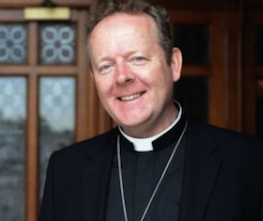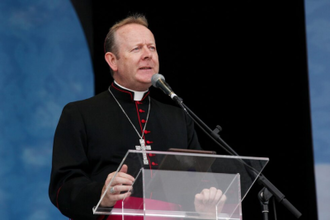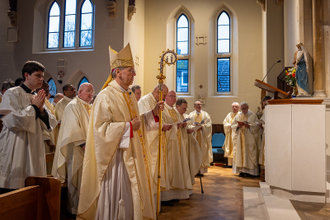Irish archbishop calls for atonement, inner healing and hope in aftermath of abuse scandals

Archbishop Eamon Martin
"The Church of the future in Ireland is a Church which serves … is less about maintenance and monuments and more about mission and evangelisation" Archbishop Eamon Martin told the graduate class of 2022 in theology and philosophy in his role as Chancellor of Saint Patrick's Pontifical University, Maynooth on Saturday. He said: "There still remains much more to be done to address the legacy of violence, to build reconciliation on this island, and to heal the deep wounds of generations of conflict."
But Archbishop Martin welcomed the group of graduates which were very different from those on the day he graduated in 1986 - mostly young men training for the priesthood or religious life. Today's graduates are mostly laymen and women, and included two Coptic Orthodox sisters, he said.
The Archbishop expressed his hope that the new graduates become active in the next important phases of Ireland's Synodal pathway. "Ten years from now the Patrician year 2032 will mark 16 centuries of Christianity in Ireland. We need your help in creating a vision for the next chapter in the life of the Church in Ireland. We must be more confident and prophetic in the dialogue between faith and culture in Ireland; our Church must proclaim with both conviction and compassion the Good News of salvation in Christ; in face of a culture of death we must choose and witness to the challenging Gospel of Life; listening to the "cry of the earth" and the "cry of the poor", we must become a Church which cares more for the beauty and wonder of God's creation while always pointing beyond this world and enkindling a longing for eternal life; conscious of the unfinished business of peace in Ireland, we must join with our brothers and sisters in other traditions and faiths to foster greater harmony and reconciliation on this island.
The Synodal process can help in developing such a vision and manifesto for the future which is both ancient and new, and which can bring afresh to our troubled world and its many lonely and wounded people, the joyful message that 'Christ is alive', 'Christ is our hope!'"
Archbishop Martin's full address follows:
I have a photograph taken back in 1986 at the end of October of me and some of my family standing outside this beautiful College Chapel just after my graduation from the Pontifical University here in Maynooth. Saint Joseph's Square, in its autumn colours, looked just as beautiful as it does today and I remember that same sense of joy and achievement which you and your families are feeling today.
Our graduation class was very different to today's. It consisted largely of seminarians and religious; the majority were young men like me, in our twenties, journeying towards ordination as priests for the various dioceses in Ireland, or as missionaries heading abroad to spread the Gospel. Your class is mostly made up of lay people of diverse backgrounds and cultures, including adults from all over Ireland who have decided to study Theology later in life and make a personal contribution to leadership at parish and diocesan level; and, we have a "first" this year - I welcome Sister Gabriella and Sister Philomena, the first ever female religious of the Egyptian Coptic Orthodox tradition to study theology at Third Level. Welcome also to you, Bishop Anthony, joining them to celebrate this special moment.
Church and society have changed immensely since the mid-eighties when I studied theology here - you are graduating in a very different world, and a greatly changed Ireland. There was still violence on our streets back in 1987 when I returned home to Derry from Maynooth. The Good Friday Agreement and the peace process were still more than a decade away; 106 people were killed in the Troubles that year, almost half of them civilians. Ten of those civilians were among the eleven people killed on this very weekend in 1987 in the Enniskillen "Poppy Day" bomb. We thank God for the positive progress in peace since those dark days, but there still remains much more to be done to address the legacy of violence, to build reconciliation on this island, and to heal the deep wounds of generations of conflict.
Church wise, so much has changed in this last 35 years. I could never have imagined, leaving Maynooth, 35 years ago, the seismic changes that were to take place - the significant decline in regular sacramental practice; the fall-off in vocations to the priesthood and religious life; the shocking revelations of abuse in the Church. I sometimes wonder why it is that, when we were studying theology here in the 1980s, we didn't anticipate what was about to happen in the Church - perhaps we should have; was it because, in our studying and reading of Theology and Philosophy, we didn't engage enough in open discussion and dialogue, or really grapple with the big questions of the day for the Church and its mission?
I believe that is why many people are finding the current Synodal process in the Church to be stimulating and refreshing, and are welcoming the opportunity to engage in prayerful discernment and discussion; although, I do recognise that not all feel that way: some Catholics are confused by the Synodal process; they find such openness a potential threat to the stability and certainty of Church teaching. It is therefore very important that we work hard together to preserve the unity and communion of the Church at this time.
In August the Irish Bishops published the key points that were heard during the first phase of the Synodal process. The National Synthesis reveals significant challenges for the handing on of the faith in Ireland. There are clear calls for greater transparency and participation in decision making and for more accountability within our parish and diocesan church structures. There is a longing to connect with the energy and gifts of our young people and a call to discover fresh models of responsibility and leadership in the Church which will facilitate the role of women, as well as men, and help reach out to those who in recent decades have left the Church, or who feel excluded, forgotten or ignored. There is a crying need for atonement, inner healing and hope in the aftermath of the abuse scandals.
Our Synodal journey is taking place at a significant turning point in the history of the Church here. In 2029 we will mark the bicentenary of Catholic Emancipation and, as it approaches, there is a sense that we are in some ways drawing to a close a significant chapter in the life of the Church here, while at the same time seeking a new vision of living faith for the future.
The Synodal reflections so far have merely skimmed the surface. It is clear that we need to go much deeper in our listening, reflection and dialogue, and much wider in our conversations. And that, Pontifical University graduates of 2022, is where you come in!
You are well equipped to become active in the next important phases of Ireland's Synodal pathway. Ten years from now the Patrician year 2032 will mark 16 centuries of Christianity in Ireland. We need your help in creating a vision for the next chapter in the life of the Church in Ireland. We must be more confident and prophetic in the dialogue between faith and culture in Ireland; our Church must proclaim with both conviction and compassion the Good News of salvation in Christ; in face of a culture of death we must choose and witness to the challenging Gospel of Life; listening to the "cry of the earth" and the "cry of the poor", we must become a Church which cares more for the beauty and wonder of God's creation while always pointing beyond this world and enkindling a longing for eternal life; conscious of the unfinished business of peace in Ireland, we must join with our brothers and sisters in other traditions and faiths to foster greater harmony and reconciliation on this island. The Synodal process can help in developing such a vision and manifesto for the future which is both ancient and new, and which can bring afresh to our troubled world and its many lonely and wounded people, the joyful message that 'Christ is alive', 'Christ is our hope!'
I invite you then to become actively involved in our ongoing Synodal conversations. I also encourage this great Pontifical University at Maynooth to bring its resources and talents to the task of ensuring that the Church of the future in Ireland is a Church which serves; a Church which is less about maintenance and monuments and more about mission and evangelisation.
Dear graduates, congratulations again! Celebrate and give thanks for what you have achieved, but please do not see this as the end of your journey in learning and in faith. Be mindful of the many people who have helped you along the way - your lecturers and tutors, supervisors, mentors and sponsors - not just those who directly assisted your learning process, but also your friends and loved ones who encouraged you to achieve your full potential.
On behalf of all of us here I'd like to acknowledge the dedication and commitment of Dr Noel O'Sullivan and Dr Kevin O'Gorman who have retired from the faculty of theology this year. We wish them the very best for the future. We also thank Professor Tom Casey, the dean of philosophy, who is taking up a new pastoral assignment after helping to lay new foundations for our faculty of philosophy in recent years. I offer best wishes to Dr Simon Nolan in his new role as dean of philosophy, to our new professor of moral theology, Professor Tobias Winwright and to our recently appointed lecturer in systematic theology, Dr Joshua Furnal.
President Father Mullaney, members of staff, guests, President of Maynooth University on behalf of all of us here today I say well done again to today's graduates, family members, friends and academic staff. Thank God for giving such success to the work of our hands. Guim rath Dé ar bhuir saotháir amach anseo. Comhghairdeas libh go leir.

















